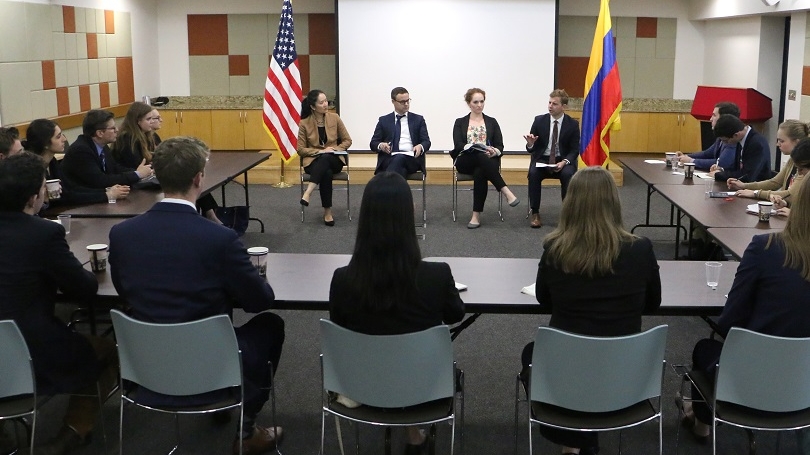
- Public Policy
- Leadership
- Funding
- News & Events
- About the Center
Back to Top Nav
Back to Top Nav
Back to Top Nav
Back to Top Nav
After a relaxing weekend in coffee country, the traveled back to Bogota for a final round of meetings. After a bagged breakfast and a few last sips of coffee, we were off. Little did we know the surprise guest we had in store.
Our first stop in Bogota was our long awaited debrief with the U.S embassy. After two weeks of traveling throughout the country and engaging with stakeholders from all sides of the conflict, from FARC ex-combatants to hardline former government officials, we had compiled a long list of questions to gain some firsthand insight on just how the US intends to weigh in on this incredibly complex peace process. Officers from all corners of the foreign service, from public affairs representatives to economic and USAID analysts, shared their professional backgrounds and offered their expert opinions on the peace process. We discussed the issues of justice and human rights, extradition policy, the state of Colombia’s ongoing infrastructure projects, as well as the embassy’s relationship with the Colombian media. We left the embassy with both some deeper insights into US policy in Colombia, and perhaps our best group photo.
Now for the surprise. Upon landing in Bogota and settling onto the bus that would take us to the embassy, Professor Wheelan made an announcement.
“I just received a very exciting call. Former President Uribe would like to Skype with us this afternoon.”
Our last meeting in Colombia took place at the home of Laura Ulloa, a political scientist and activist with an incredible story to share. When Laura was 11 years old, she was kidnapped by the FARC on her way home from school and held captive for 7 months. Laura has since dedicated her life to the study of political science and shares her story to promote the peace, forgiveness and reintegration in Colombia. After greeting us with coffee and pandebono (cheese bread), a local staple from her hometown, Laura delved into the story of her kidnapping, her relationship with her captors and how she came to become one of Colombia’s staunchest advocates of peace and reconciliation. “Being kidnapped showed me that they were victims as well. Many of them were abused, many of them displaced, and the FARC was simply the nearest escape route. I had had everything all my life.”
This provided a particularly interesting backdrop to the second element of this meeting. Laura had been kind enough to allow us to hold our Skype conference with former President Uribe, the face of the far-right movement against the peace agreement, from her living room. Perhaps at one of the most suspenseful points of Laura’s story, we heard the jingle from Professor Wheelan’s laptop. It was the President. Briefly interrupting Laura’s story, we huddled around Professor Wheelan’s laptop, set at the head of Laura’s dining room table, and interviewed the former President.
Despite stark polarization over the peace process in Colombia, we learned that many supporters of the peace agreement and even pro-peace activists like Laura can actually share common ground with President Uribe’s critiques of the peace deal. The President explained that he does not oppose peace with the FARC itself, but rather permissive terms of peace that threaten the upholding of justice in Colombia. This provided a both surreal and hope-inducing end to our time in Colombia. At the end of the day, every Colombian we met on our trip bought into the mission of transitioning their country away from its war-torn past. For our take on the mechanics of that transition, and the US role in its facilitation, take a look at our memo. Shameless plug.
On behalf of the students of PBPL 85 – Many thanks to Professor Wheelan, Lucy, the Rockefeller Center and all of our hosts for a wonderful stay in Colombia.
Written by Gaby Sommer '19, 18F PBPL 85: Global Policy Leadership course participant
This is part of a series where PBPL 85:Global Policy Leadership students reflect on their experiences during the two-week field research portion of course. While in country, students meet with local policy leaders: politicians, academics, civil society leaders, journalists, business leaders, diplomats, and other in-country experts who help inform their analyses.